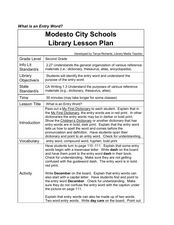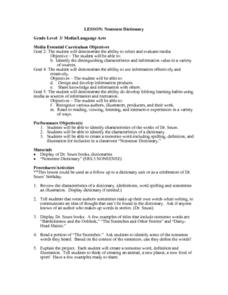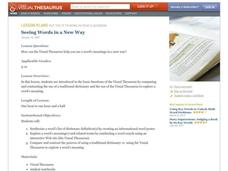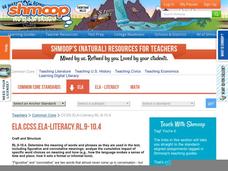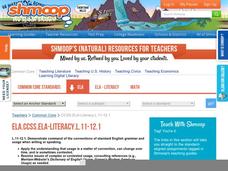Curated OER
Dictionary Work - Entry Words
Second graders examine the use of entry words in the dictionary. In this dictionary use lesson, learners look at guide words in a children's dictionary as the teacher/librarian describes the characteristics of each entry. They complete...
Florida Center for Reading Research
Vocabulary: Word Meaning, Dictionary Digs
Young scholars dig through dictionaries to uncover the wealth of information they provide. Using the included graphic organizer, children learn about target words by finding their parts of speech, pronunciation, definition, synonyms, and...
Florida Center for Reading Research
Vocabulary: Word Meaning, Dictionary Cube
Scholars work together to define words and answer questions using a dictionary cube.
Curated OER
Picture Dictionary
Young scholars write and contribute one page for a class picture dictionary. They discuss how to alphabetize words, and examine both regular and picture dictionaries and how they are organized. Next they create a page for the class...
Southern Poverty Law Center
Analyzing How Words Communicate Bias
Words are powerful ... can your class choose them wisely? Scholars evaluate news articles to discover the concepts of tone, charge, and bias during a media literacy lesson. The resource focuses on recognizing implicit information and...
Southern Poverty Law Center
Evaluating Online Sources
All sources are pretty much the same, right? If this is how your class views the sources they use for writing or research projects, present them with a media literacy lesson on smart source evaluation. Groups examine several articles,...
Florida Center for Reading Research
Vocabulary: Word Meaning, All For One
Given a deck of cards with different words printed, pairs draw cards and work together to locate definitions for each multiple-meaning word. Learners complete a worksheet that challenges them to write the word, two of its definitions,...
Curated OER
Nonsense Dictionary
Third graders explore various media. They identify the characteristics of various sources and use that material effectively. Students identify the characteristics of Dr. Seuss' work and the characteristics of a dictionary. They create a...
Curated OER
Create a Word
Brainstorm new words for a class dictionary. In small groups, young learners read and discuss an article about how words get into dictionaries. They then develop a new word, use it in a sentence, and share their creations with their...
Curated OER
Seeing Words in a New Way
What's the best resource to use when looking up words? Use Visual Thesaurus to see a word's meaning. The class accesses the interactive website and then compares and contrasts the difference between using a traditional dictionary and the...
Curated OER
Food Dictionary - Harvest Festival
Students explore healthy foods and dictionary organization. Students create a list of healthy foods. They construct their own food dictionary, with illustrations. Students model how a dictionary page should be filled with a picture,...
Shmoop
ELA.CCSS.ELA-Literacy.RL.9-10.4
The fourth standard for reading literature in the Common Core calls for young readers to be able to determine the figurative and connotative meanings of words and phrases. Use this resource, a continuation of a series of Common Core...
Florida Center for Reading Research
Vocabulary: Word Meaning, Undercover Meanings
Support young scholars with studying new vocabulary using this foldable resource. By cutting and folding the included template, learners can record definitions, examples, and a sentence for four different words.
Curated OER
Use the New Internet Library for Adult Learners
Adult learners, examine the Internet to answer life skills, use an online dictionary, evaluate web sites and fill in online forms. They will also write about web sites in this series of activities.
Curated OER
If a Runner Runs, Does a Sweater Sweat?
Play with words and word meanings involving the suffix -er. After reading a sample list of words, young readers look up each one in the dictionary to decide which words refer to people, animals, or objects, or have three or more...
Curated OER
Guided Reading Organizer for Chain Reaction
The class uses Chain Reaction, a magazine, to build a better understanding of Latin and Greek roots found in scientific vocabulary. They use two attached worksheets to help them read a scientific article, using visual clues and their...
Shmoop
ELA.CCSS.ELA-Literacy.RL.11-12.5
What would happen if I structured this review by beginning in the middle of it? Or by flashing back to the dinner I had last night that gave me bad heartburn, and then transitioned into how the lingering burn of acid seeped into my...
Shmoop
ELA.CCSS.ELA-Literacy.L.11-12.1
Despite English grammar rules, in the e-world the plural of mouse is mouses. lol. Standard American English is constantly evolving. Introduce your class members to a variety of terms that describe different usage changes (economy,...
Curated OER
Landform Dictionary
Third graders use a word processing program to create a working dictionary, including definitions and pictures, of physical land forms used in the study of different regions of the world.
T. Smith Publishing
Space Vocabulary Dictionary Skills
Show your class how to use a dictionary and teach class members vocabulary related to space travel along the way. Pupils must place vocabulary words that pertain to space travel between the correct dictionary guide words. Next,...
Curated OER
Bill Irwin: All in a Day's Work
Students perform for an audience. In this performing arts lesson plan, students explore the work of actor Bill Irwin in a variety of roles. Students direct and perform a fairy tale in small groups .
Curated OER
How Cell Phones Work
Fifth graders are introduced to the text, LITERACY LINE viewing the contents page. They review the definition of explanatory writing; discussing the features used and complete a KWL chart to identify what they already know about how a...
Curated OER
Media File Types
Students read about several different media file formats and determine which one is best used in specific situations. They go to different sites and read about the different media formats. Students then answer the questions that are...
Florida Center for Reading Research
Vocabulary: Morphemic Elements, Getting to the Root of It
Young readers learn how to get at the root of new vocabulary with this fun language arts activity. When working in pairs, children begin by matching unknown vocabulary words to their Greek or Latin roots. When all the vocabulary cards...


